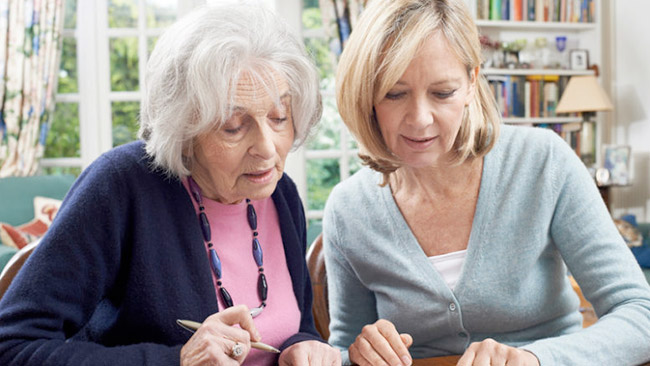– And welcome everyone to Answers for Elders Radio Network. And we’re here on a very special weekend. For those of you that are listening on the podcast network, even though we’re talking about a topic that is really relevant no matter what area or time of the year that you are coming from, this is really a holiday segment because so many of you, I’m sure, are driving to family locations, maybe listening in the car and wanting to know how to deal with a loved one who has dementia. And it’s kind of a unique scenario in families because a lot of families, they come together, they may be in a situation where you haven’t seen your loved ones, so you don’t necessarily know what to expect, and there’s a lot of questions about how do we deal with dad, mom, aunt, uncle, and include them in our family gathering. And so I am so proud to have our wonderful Kelley Smith from CarePartners Senior Living, who is a vice president of Marketing and Sales, and Kelley, I am so glad that you’re the one I get to talk to, since CarePartners is such an amazing organization that has a real specialty working with seniors that have Alzheimer’s dementia. So, Kelley, welcome to the show.
– Thank you so much for having me.
– Kelley, we’re going to have what’s called the six tips, and I’m so excited about you bringing forward because this is information from kind of a world renowned speaker and expert on Alzheimer’s dementia, and for those of you that have loved ones, I strongly encourage you to check her out online. And it’s a person by the name of Teepa that’s T like Tom, E, E, P like Paul, A. So Teepa Snow. She’s incredible and those of us in the industry have probably learned a lot from her. She’s on YouTube, you can pick up a lot of her philosophies on how to communicate and understand the changing brain of those that are dealing with the progression of Alzheimer’s disease or dementia. And Kelley, you do a lot of training for your people, and I’m sure a lot of your information comes from Teepa as well, does it not?
– We do some of the PAC training, and things that she does with our teams, absolutely. We consider her to be quite an expert in the field. And you want to take advantage of any knowledge that you can that helps you navigate this disease a little bit better for the people you take care of. She’s pretty amazing.
– Yeah she is. And before we start with the tips, I really want to share with our listeners a little bit about current facts and figures about Alzheimer’s disease, because one of the things that as a family you may not realize how many people are out there right now. According to the Alzheimer’s Association, more than six million Americans of all ages have Alzheimer’s disease. There are those that get them, have symptoms in present. That is a condition of a brain that may not show up for decades, but they may be susceptible or have the have the awareness that this could progress to Alzheimer’s. And the great thing about it is that we’ve done enough research — if you catch it early enough, there are actually ways now to reverse that so that condition never comes through. And if you check out our podcasts with Athira Pharma, there’s a lot of information about the clinical trials that have been happening, that’s very exciting.
– The other thing I want to share with our listeners about: they’re over six million Americans of all ages who have Alzheimer’s, and an estimated 6.5 million Americans age 65 or over who are living with Alzheimer’s disease. Basically, the majority of those are 75 years old and older. And if you look at anyone over the age of 65, which includes me in that age group, about 11% of those over 65 have some sort of dementia and Alzheimer’s. And it progresses and gets more evident as you get older, only because you may have Alzheimer’s, or the gene within you, but it’s not really expressing itself yet, if that makes sense, to all of you, as you’re looking, so when you look around in your circle, if you’re driving your vehicle and you’re thinking this probably doesn’t apply to me, it probably does. You probably know a family, you may have a loved one, a distant relative, coworker, someone like that, that has the beginning stages or advanced stages of Alzheimer’s disease. And so we find ourselves oftentimes in our interactions with people, and we find that they may have dementia or Alzheimer’s, and we may not necessarily know how to communicate, how to best serve them, how to feel comfortable in a dialogue. And so, Kelley, what are you finding with families right now as far as their challenges in communicating with those with Alzheimer’s?
– Well, I think the communication problem, a lot of it stems around education. We sometimes have higher expectations than we should. I think people also get frustrated, because when mom does have those moments of clarity, we think she’s okay again. It doesn’t always quite work like that. People get frustrated with the same story 600 times, but that’s also part of the disease. They can’t remember if they told you this or not, or who they told but, a lot of things with communication. But it’s also, as the communication declines for their loved one, a lot of times, it’s how do you keep up? What do you do? And that that’s where people feel lost, not so much the frustration, but, what do we do now?
– Baby boomers are a huge piece of this because baby boomers are about 40% of the population, close to, and if you look at the baby boomer population and you know who we are — and when I’m saying we, because I am a baby boomer — just because of the dynamic of where Alzheimer’s is, we’re looking at, conceivably that number is going to probably grow just due to the percentage of the population, to about 14 million people by the year 2060, that will actually have conditions of Alzheimer’s disease and dementia. So it’s a real condition that we all need to be aware of. And I think, more than anything, holiday season gets busy, we tend to try to make everybody happy, which is wonderful, and we’re hopeful that you will include, all of you if you have loved ones, those who have Alzheimer’s disease and they may be living at home still, because a lot of them are being cared for by unpaid family caregivers. And so we would love to give you guys Teepa Snow’s six tips on how to get through the holidays easily, to have a better holiday season when dementia is involved. And so Kelley, as far as you are concerned, before we get into this in our next segment, I want to kind of zero in on, what’s Kelley’s 20-second speech on how to do that?
– On how to do which part of it?
– On How to get through a good holiday season with Alzheimer’s and dementa.
– Well, there’s a ton of different things we could talk about, but I think that the easiest thing is, first of all, don’t be afraid to ask questions. If mom and dad are in a community, you feel free to talk to those folks and find out, what are some activities maybe they’re doing in the community that might be better for mom and coming down and taking them out, ask advice, call the Alzheimer’s Association. They have resources, ask questions. But I think that’s where we would start. First of all, it’s got to start around: what is your plan, and then how do we execute that?
– Yeah, and that’s the key thing. Everybody’s different and everyone’s unique. Every family situation is unique. if you’re bringing mom and dad home, there’s other considerations, like do you have a list of their medications, did you bring… if they have incontinence issues, did you bring incontinence supplies? Did you think about what are the key things just logistically of bringing mom or dad or aunt or uncle into your home. Can they get up the stairs? Are they in a wheelchair? Can you get to the bathroom? All of those things that you know are considerations for sure? Are they not? Kelley?
– Well absolutely. And not only that, but you also want to check in. Can mom or dad… has their dementia gotten to a point where maybe they’re gonna need some some help eating? Everybody’s circumstances are different, everybody’s journey with dementia is different. But again, there’s so many things to take into consideration because you got to remember, somebody with dementia, you bring them into your home and it’s all decorated for Christmas and you’ve got bright lights and pokey, shiny, crazy lots of stuff going on, loud Christmas music coming around. That might not necessarily be the best environment.
– I always say with our our therapy dogs, a matter of fact, during twelve Days of Goodness when we were out and we visited over 36 communities, and most and a lot of them were CarePartners communities. We had so much fun, but even some of our volunteers did not realize, a couple of them they put flashy lights on their dogs, just being festive and I said, you can’t do that, take the take the flashing lights off. So there’s a lot of obvious things that we need to look at. And as we’re looking at things. So before Kelley and I start, I just want to do an overview of… CarePartners is primarily in the western sector of the United States, but I mean in what state of Washington. But you’re also in Arizona. So tell us a little bit about where your communities are and how you specialize in Alzheimer’s care.
– We have communities from Lynden to Lacey, Bremerton’s, Spokane, Arizona, And what we specialize in, our main footprints called the cottages. What’s nice is there’s a lot of autonomy for the residents. There’s four little houses. They get a little neighborhood, very safe environment. They can go outside, they can enjoy the beautiful weather and visit friends and other cottages like a little neighborhood. But it works and it works really well. And then again when you implement the journey training and Pact training, a lot of things that are out there that make things available, that also again adds to the environment for the residents. That cottage footprint works really well.
– Perfect, And Kelley and I are going to be right back in our next segment, and we’re going to start the six tips for making holidays successful for those who have Alzheimer’s and dementia right after this.













